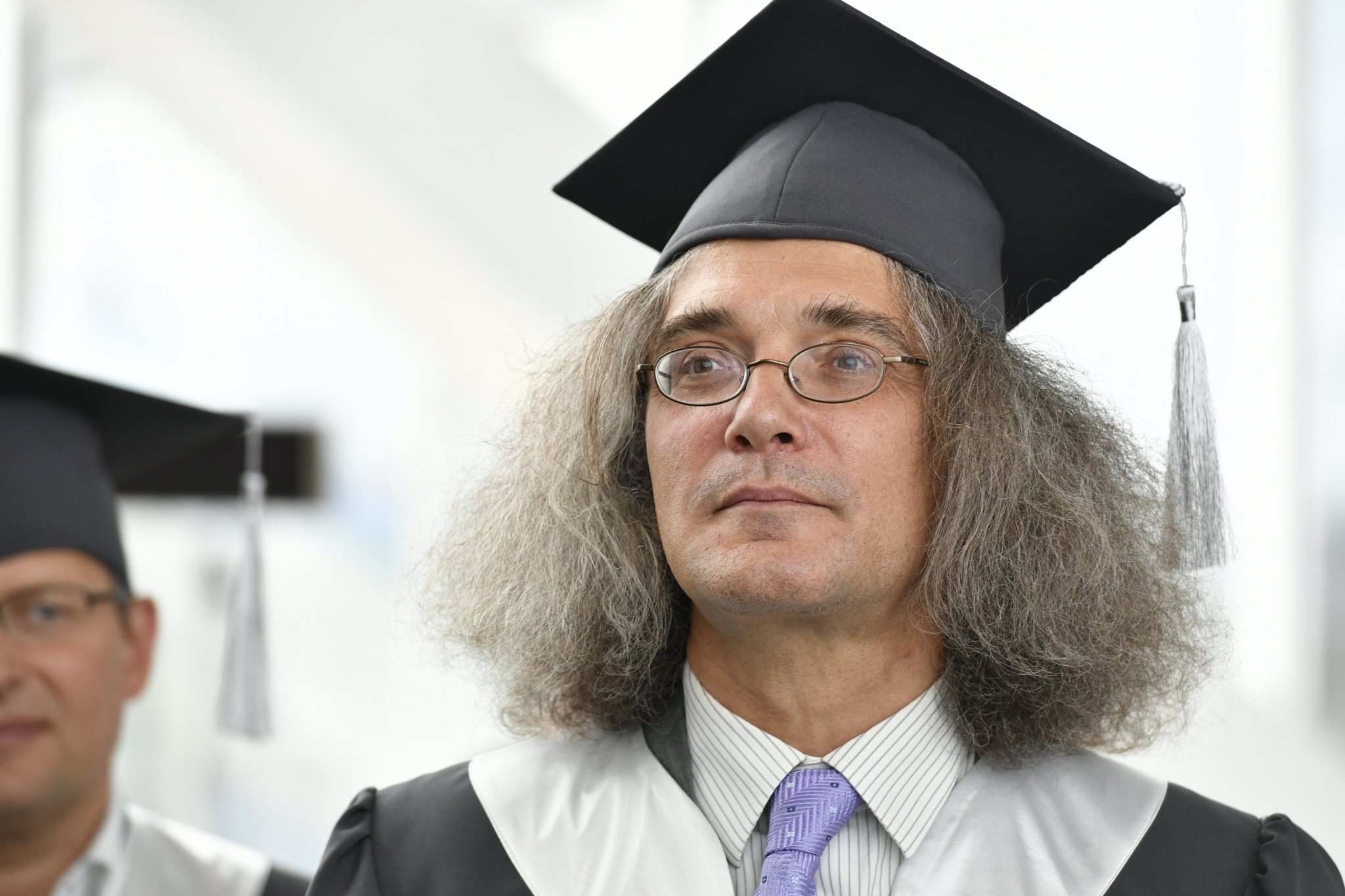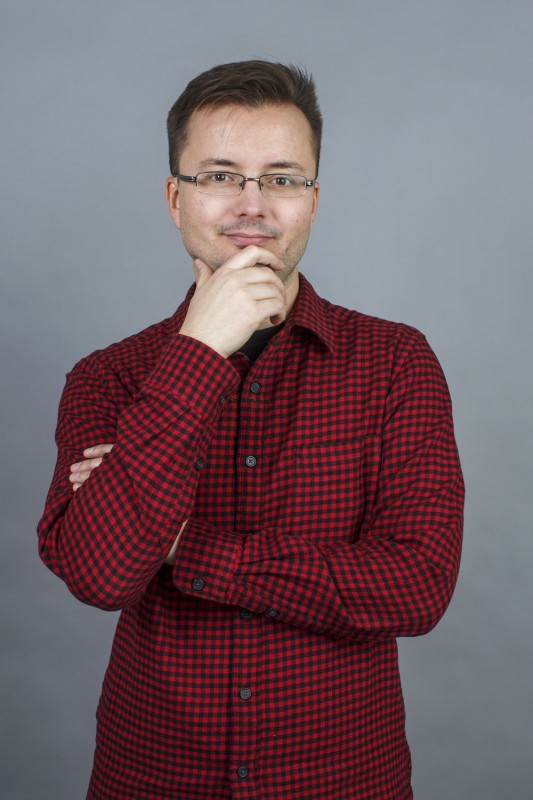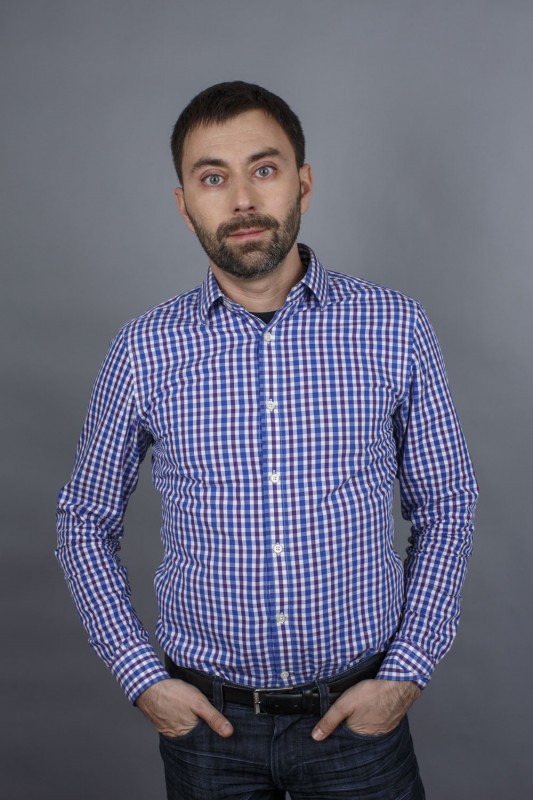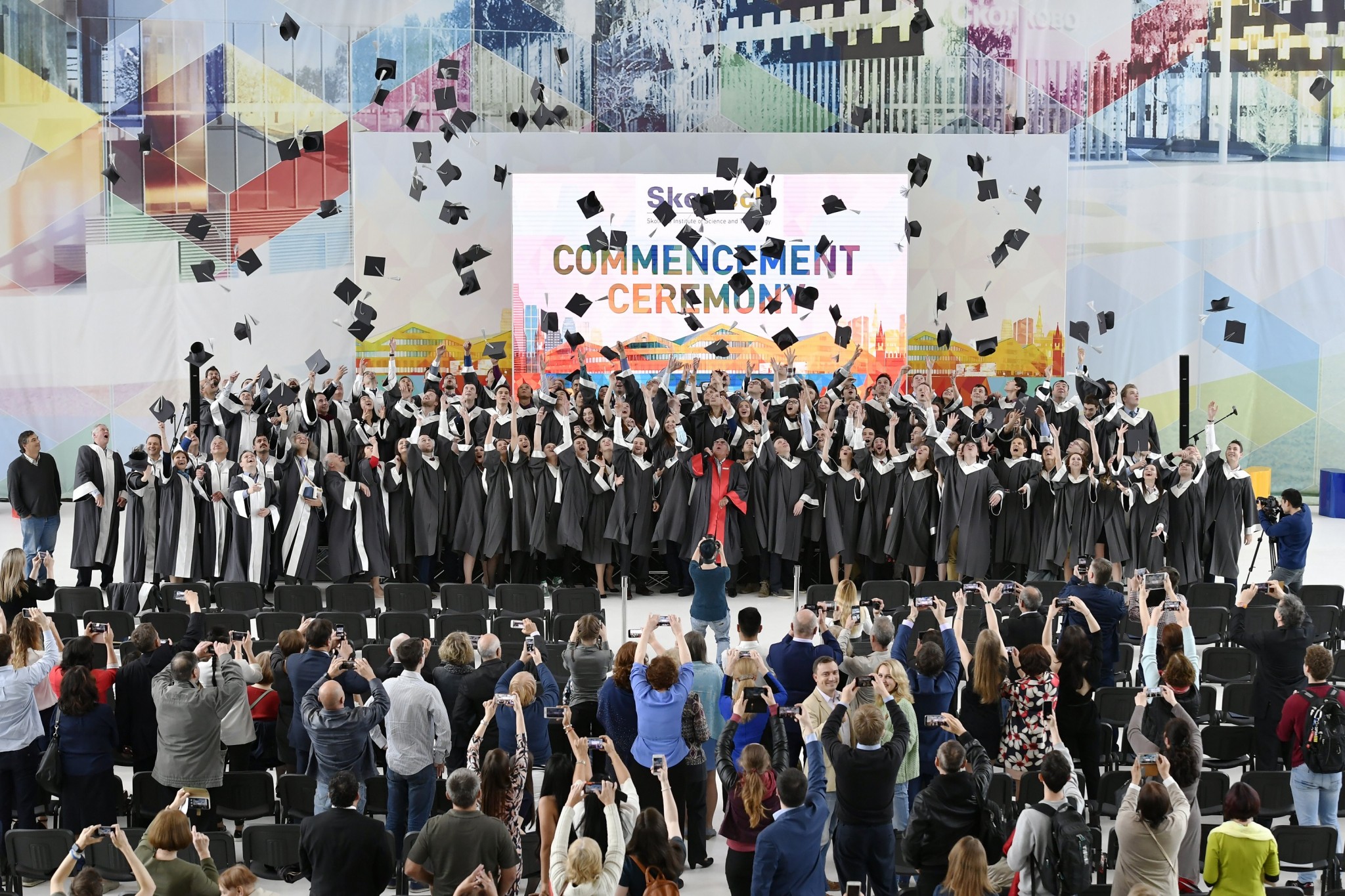
Skoltech graduates and faculty members toss their graduation caps in the air after the 2017 commencement ceremony.
Skoltech celebrated the third graduation in its short history on Friday, sending scores of MSc and PhD graduates off to create startups, join industry giants or continue their higher education.
A unique element added to this year’s graduation ceremony was the introduction of several annual awards honoring some of Skoltech’s leading instructors. Categories included: Teaching Excellence, Best Research Supervisor, Best Mentor, Best Career Trainer and Best Lecturer.
The award recipients were selected by student voters.
Speaking to a packed audience of graduates, faculty members and their supporters, Skoltech Associate Provost and Dean of Education Anna Derevnina said that votes were cast for every member of the Institute’s faculty. In the end, five professors secured the most ballots, cementing their statuses as the inaugural winners of the Skoltech teaching awards.
We interviewed the award recipients and some of their students in order to gain insights into the unique teaching and mentoring methods of some of Skoltech’s finest professors.
Teaching Excellence: Professor Albert Nasibulin
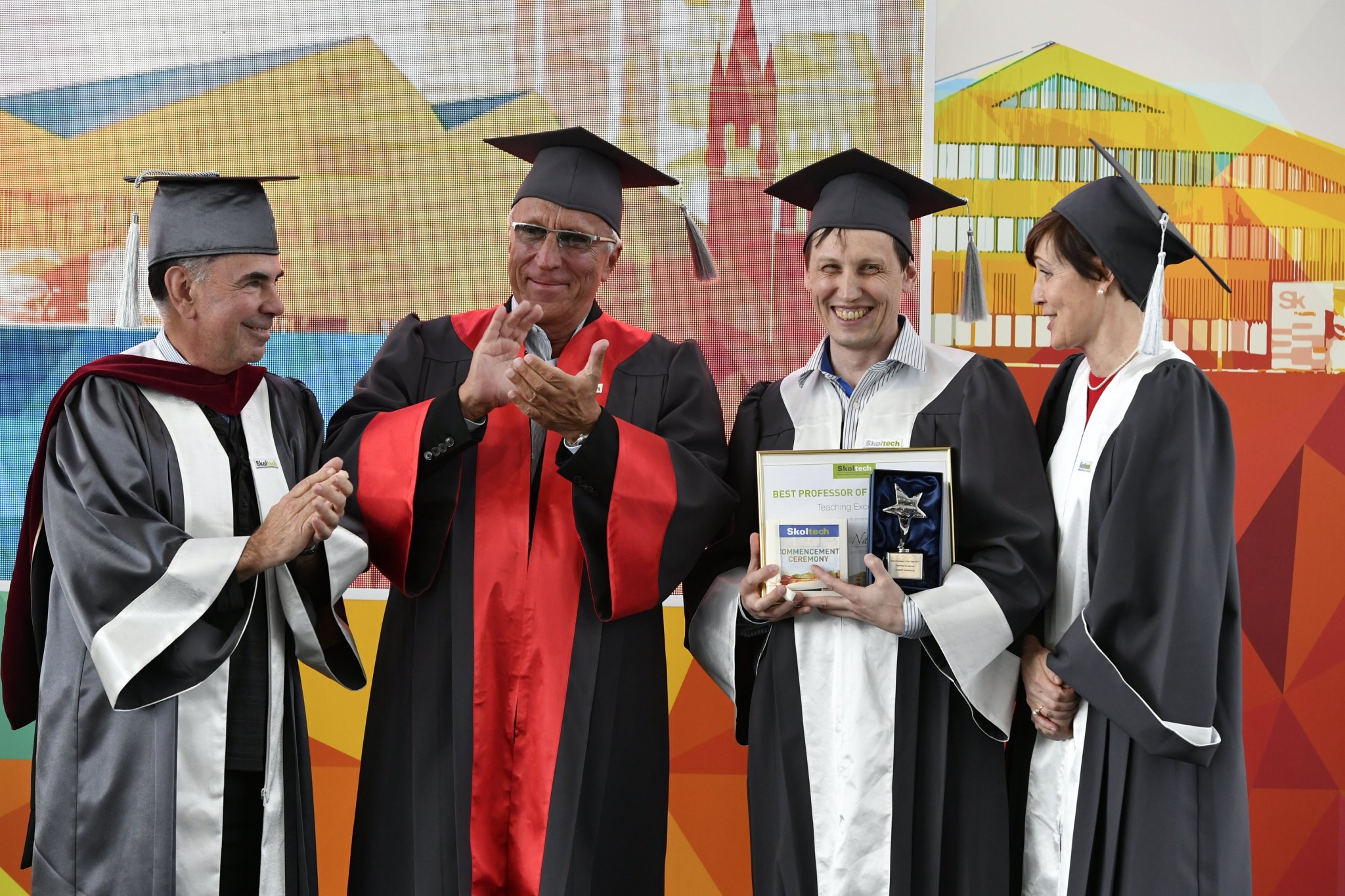
From left: Skoltech Founding President Edward Crawley, Skoltech President Alexander Kuleshov, Professor Nasibulin and Dean of Education Derevnina. Photo: Skoltech
Prior to announcing the recipient of the Teaching Excellence award – the crème de la crème of the Institute’s teaching awards, which honors its best all-around educator – founding Skoltech President Edward Crawley announced that the prize would be accompanied by a memorial endowment in honor of his father, whom he credits with having instilled in him a deeply rooted passion for education.
In an interview following the ceremony, Professor Nasibulin of Skoltech’s Center for Photonics and Quantum Materials, reflected on his approach to teaching: “I think that to gain success in any profession the most important thing is to love what you do! If you love what you do and you do it with great pleasure and passion, it is usually appreciated by others.”
He attributed part of his soaring success as an educator to several pedagogical courses that he took while teaching at Aalto University in Espoo, Finland. “As a matter of fact, at Aalto University all tenure-track professors must go through a pedagogical education, and like students, earn credits for learning this subject; this is crucial to getting promoted to the next level.”
When asked whether his teaching excellence award caught him by surprise, he said: “Frankly speaking, I was very much surprised as many other professors probably would be in my position! At Skoltech we have a very strong team of professors with brilliant teaching reputations and very high scientific levels. It is my great honor to get the award!”
Daler Amanbaev, an MSc graduate who was honored with a Best Research Thesis award at the commencement ceremony on Friday, said that Professor Nasibulin’s teaching style contains the ideal blend of grit and raw talent.
“There is a saying that goes: ‘Hard work beats talent when talent doesn’t work hard.’ Professor Nasibulin is a talent that works hard,” said Amanbaev. “From the moment he appears in the laboratory, Professor Nasibulin devotes himself to the perfection of whatever he pursues – projects, ideas, papers, course materials, collaborations, etc. Moreover, he stays consistent in this process.”
Amanbaev added that Professor Nasibulin transitions between various roles as an educator so as to provide his students with optimal support in any scenario.
“He is the mentor – not the boss – of his research group at the Laboratory of Nanomaterials. The openness and encouragement of ideas through guidance instead of direction are pivotal elements of his teaching style,” the recent graduate said.
Amanbaev added that to him, the professor was an obvious choice for Skoltech’s top teaching award.
“I believe Professor Nasibulin was awarded the Teaching Excellence Award not only because he is a great scientist and leader, but also because he is a phenomenal course instructor. His devotion to and enthusiasm for the educational process attract the closest attention and respect from students from various educational tracks, providing an effective platform for interdisciplinary communication,” he said.
For his part, Professor Nasibulin expressed gratitude to everyone at Skoltech that lit the path to Friday’s honor: “I know whom I owe… The award would not be possible without the great support from the members of my group, from Skoltech MSc and PhD students, professors and postdoctoral researchers and of course my family. I really appreciate their endless support and help in creating a very pleasant atmosphere for work, teaching and research!”
Best Research Supervisor: Professor Konstantin Severinov
“I am convinced that the role of a research supervisor is to bring out excellence in students,” said Professor Severinov, Director of Skoltech’s Center for Data-Intensive Biomedicine and Biotechnology (CDIB). “There are multiple ways to do this and it does not necessarily have to be gentle, but it is always about excellence, responsibility and growth. This style is distinct from the attitude that is unfortunately still common in some Russian universities and institutes, where students are considered to just be pairs of hands.”
While he wasn’t necessarily shocked when he was named as recipient of the award, he was thrilled: “It sure felt good, though was not entirely unexpected. Compared to my lab at Rutgers, where I run a postdoc-only sleek research operation, I spend a lot of time with students at Skoltech and it is always nice to be appreciated for your efforts. This means I’m doing something right and will hopefully help attract more students in the future.”
Professor Severinov’s former MSc student Artem Isaev, a recent graduate who was awarded a prize for academic excellence during the commencement ceremony on Friday, lauded the experience of conducting research under Professor Severinov as the ideal balance between independence and strategic guidance.
“The main feature of being Professor Severinov’s student is the feeling of scientific independence,” said Isaev, who has been admitted to Skoltech’s PhD program. “In our group, we’ve begun research in a completely new field and at the early stages it was mainly exploratory work… What’s important is that while Professor Severinov allowed us to try new techniques, he clearly raised key questions and elucidated the main goals of the research, thereby protecting us from conducting futile experiments.”
Isaev noted that when he and his fellow researchers were deeply immersed in the details of a given set of results, they were often shocked by Professor Severinov’s ability to eye a graphic for just a few moments and then point out key issues that had previously eluded their attention.
“I’m certain that this combination of independence in verifying one’s own ideas in tandem with thorough and critical discussion is what’s important for professional growth and what makes Professor Severinov’s supervisory style special,” said Isaev.
Isaev’s hard work under Professor Severinov paid off; an independent reviewer praised the recent graduate’s MSc thesis as having exhibited an “excellent level of experimental work,” describing it as “classical molecular biology, in contrast to many ‘low input/high throughput/zero output’ works.’”
Nadezhda Volovich, another recent MSc graduate who is now headed to Caltech to complete a PhD program, echoed Isaev’s sentiment about Professor Severinov’s knack for noticing small but imperative details.
“When we would discuss scientific papers, he asked really impressive questions, and he usually asked us about things we hadn’t previously thought about,” said Volovich. “We thought we understood a paper really well, but then Professor Severinov would start to ask us some questions and we realized we only understood a very general overview, and were missing key details. This taught us to doubt everything, and to prove our own results and conclusions based on data, not discussion.”
She noted that the professor was always available to provide his students with guidance and support. “He was very easy to get in touch with, which is especially impressive because he has such a huge work load and so many students,” she said, adding: “He was always incredibly supportive. Even though he wanted me to stay in his lab to complete my PhD work, he was supportive and very helpful when I decided to go to Caltech.”
Best Mentor: Professor Zeljko Tekic
“The essence of my teaching style can be summarized in three words: interaction, openness and fairness,” said Professor Tekic of Skoltech’s Center for Entrepreneurship and Innovation. “My teaching is energized through exchanges and interactions with students. To stimulate critical thinking and to illuminate ideas, I try to make my classroom an open environment where all the students feel safe to venture a response, make a comment or ask a question.”
In fact, he particularly encourages students to voice thoughts and opinions that oppose dominant opinion, or that many may initially be tempted to dismiss as incorrect or trivial: “I believe that the key to being a good teacher of entrepreneurship and innovation is to get the students challenge the common wisdom and best practices, get them involved and engaged in their education, and excited about the possibility of creating something new.”
He added that fairness is crucial to his educational style. “I believe all this is valued by students because I try to keep the ‘rules of the game’ fair and transparent,” he said.
Professor Tekic said that he was pleasantly surprised to learn that he’d been selected as the winner of Skoltech’s mentorship award, and was disappointed that he was out of town on business and was thus unable to collect the prize in person.
“Awards are nice and they encourage professors to maintain high standards, especially when they come from students,” he said. “I teach because I am fascinated by the opportunity to inspire and provoke the development of young and talented people. I view this award as recognition that I am on the right track – and motivation to do much more.”
Asked why he thought that he had been selected by Skoltech students to receive this award, Professor Tekic said that he wasn’t sure, and suggested that we speak with some of the students he has worked with. They were eager to fill us in.
Skoltech PhD candidate Hripsime Matevosyan credits Professor Tekic with having inspired her to launch a company.
“A course I took with Professor Tekic motivated my colleague [Ignasi Lluch i Cruz] and I to start our own startup in real-time urban imagery – the first ever company to provide this kind of data,” Matevosyan said.
And the professor’s help didn’t dry up with the close of the term. “Even after the course ended, Professor Tekic continued supporting us in our new endeavor by giving professional advice and motivating us to keep pushing forward, despite some obstacles along the way. For a startup such as ours, this was very important,” she said. “And Professor Tekic since then has joined our advisory board. It’s great to have people like him in our university, who really embrace the entrepreneurial and innovation spirit.”
Skoltech PhD student Natalia Glazkova said that when she was a budding entrepreneur, Professor Tekic provided her with a wealth of advice and guidance.
“He is open-minded and accessible for students,” Glazkova said. “He always gives professional, thoughtful and very helpful feedback regarding entrepreneurship ideas and research. What’s also important is that he demonstrates sincere concern about students by constantly providing feedback, staying in touch and updating them with opportunities for publishing and grant writing.”
She added: “Based on my own experience, Professor Tekic is outstanding in encouraging and supporting students to work on professional and career development. All these qualities make him a great advisor and an extraordinary mentor.”
Georgy Klushin and Alexander Ivanov, PhD students whom Professor Tekic advises, also voiced enthusiasm about the role he plays in the classroom.
“The best thing about Professor Tekic’s teaching style is that he is capable of developing courses that rely heavily and successfully on teamwork. This is particularly notable because team-based courses are a foreign concept to many Russian students,” said Klushin.
“He always finds time to talk to students and to listen to their ideas,” said Ivanov. “It doesn’t matter what the question is; he can help with advice or tell you who can help.”
Best Career Trainer: Professor Viktor Lempitsky
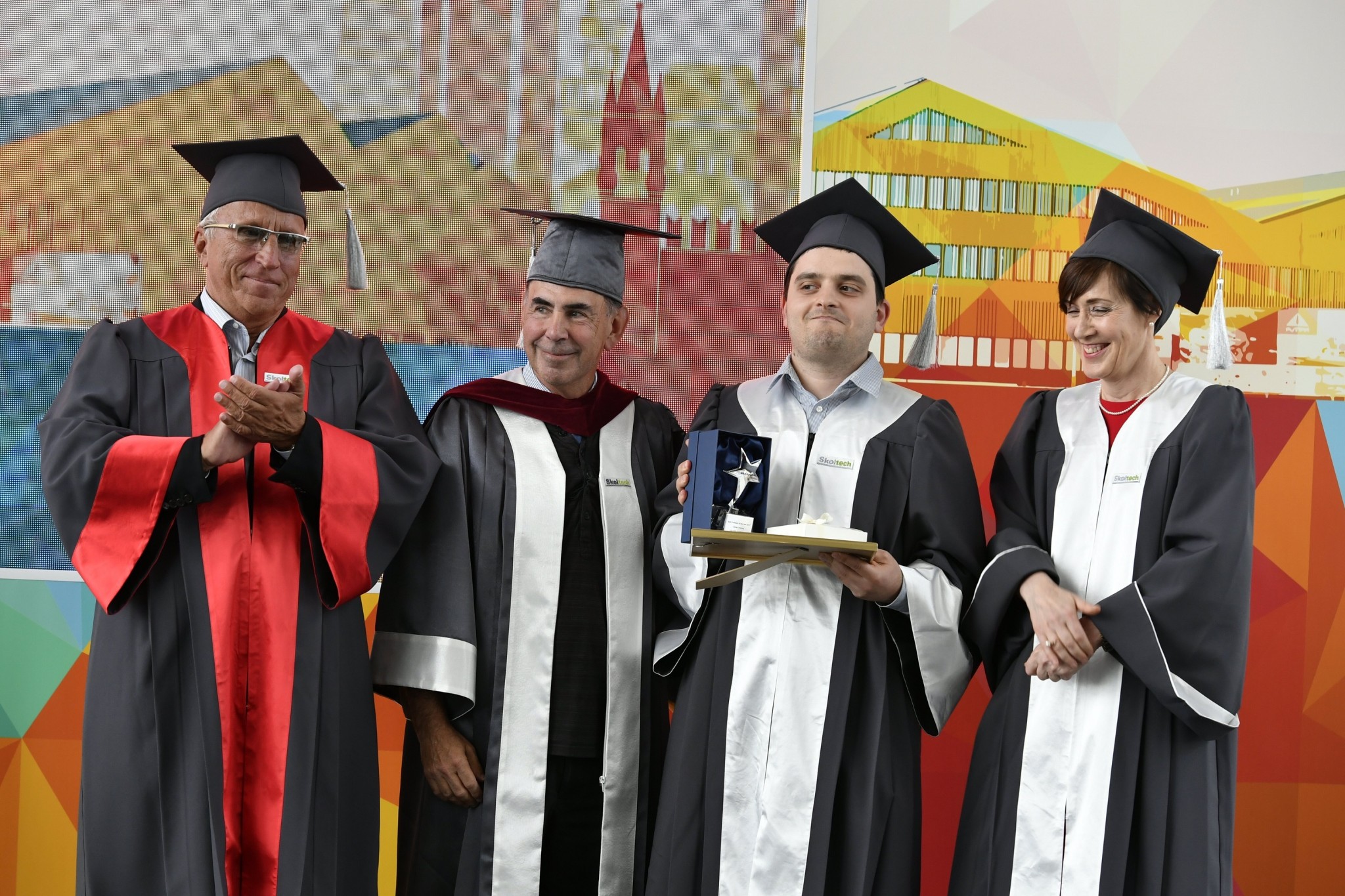
From left: Skoltech Founding President Crawley, Skoltech President Kuleshov, Professor Lempitsky and Dean of Education Anna Derevnina. Photo: Skoltech
“I do not know for sure what made the students vote for me,” said Professor Lempitsky of Skoltech’s Center for Computational and Data-Intensive Science and Engineering. “I guess that at least in part this is because I happen to work on subjects that are ‘hot,’ such as computer vision and deep learning. The students appreciate learning and trying very recent things, and the job market for these skills is excellent at the moment.”
He also attributed the popularity of his Deep Learning course to a big group that co-develops the class and includes Alexander Panin, a researcher at Yandex who specializes in machine learning, as well as current and former Skoltech students Dmitry Ulyanov, Vadim Lebedev, Victor Yurchenko and Yaroslav Ganin. “They have put a lot of effort into designing interesting seminars and assignments for this class, which made the class accessible and hands-on,” the professor said.
Asked how he felt about receiving the award, he said: “I really appreciate it. This is very reassuring and gives me extra motivation to carry on.”
Professor Lempitsky’s students offered countless examples of his drive to help young scientists and innovators find top-flight jobs after graduation.
“Without any doubts, Professor Lempitsky is a very good professor and could have been awarded the best of the best prize,” said MSc student Anastasia Makarova.
“The Best Career Mentor award is also deserved, as all Professor Lempitsky’s students have got good perspectives after graduation: several alumni are going to a leading Russian technology company and some are headed to top universities for PhD programs. Moreover, half of his students had great internships last year,” she added.
Recent graduate Mikhail Shvets, who received an Academic Excellence award during Friday’s ceremony, credited the professor with having boosted his career prospects.
“Professor Lempitsky cares about the individual aims, desires and problems of students,” said Shvetz. “He finds appropriate opportunities for each of us: in industry, academia and business. He has given me a big push in my career. I am happy to have been working under his supervision and would encourage all prospective students to join the Computer Vision Group at Skoltech.”
Best Lecturer: Professor Dmitry Pervouchine
Asked about the secrets of his success, Professor Pervouchine, also of CDIB, pointed to the subject he specializes in: “I think it is not only me but also the subject of Statistics who won the award,” he said, noting that he strives to treat his students as a team of peers with whom he is scaling a large mountain. “My role is merely to guide and keep the group together.”
That said, the award caught him by surprise. “I didn’t know there was such an award. So I was very pleased. And also, I have taught this course for many years and each time in September I think that it may be time to stop and teach something else, but again and again I get convinced that I should proceed, so I hope next year’s course will be at least as good as this year’s.”
For their part, Professor Pervouchine’s students are thrilled with his decision to stay the course.
“In my opinion Professor Pervouchine is one of the best lecturers, I’ve ever learned from,” said MSc student Anastasia Grigoreva. “I was really amazed that during each lecture he regularly checked that everyone in the class was following. He was really concerned with this point and always slowed down, explained some points again or reminded us of something relevant if it was needed.”
She added that the course was very well structured. “It wasn’t easy; homework was pretty hard and there was a lot of it, but it motivated us to do our best, look for some additional information and discuss examples of complicated statistical problems with each other. This way we were already well prepared for the tests when the time came. And in addition the grading policy was not too severe, so our efforts were rewarded.”
MSc student Alexander Tashkeev praised his professor for the sincere dedication with which he prioritizes his Statistics course.
“Despite a huge work load, Professor Pervouchine teaches Statistics with a sincere desire to impart knowledge to students,” said Tashkeev. “Coupled with his obvious talent for structuring and explaining complex things in a simple way, no wonder that all participants of his course have voted for him as a best lecturer.”
Tashkeev added that Professor Pervouchine’s supervisory skills rival his teaching skills. “When we discussed this with his other students, we all agreed that his approach to organizing laboratory work results in an ideal mixture of oversight and guidance on one side and inspiration to work independently from the other.”
